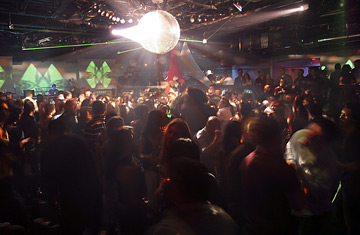
An Atlanta club
It seemed a worthy idea at the time: Last January, two competing Atlanta radio stations — one with a predominantly black audience and another with mostly white listeners — would throw a joint "unity party" at a nightclub in Martin Luther King's hometown, on the eve of his birthday holiday. The goal was to bring people of different races together for a night of exuberant partying. Seconds after the simulcast announcement by morning show hosts Frank Ski of V-103 FM and Bert Weiss of Q100-FM, the phone lines at both stations lit up with calls of support from listeners frustrated by what they consider the city's racially divided social scene. "People of different cultures don't party together [here] like they do in New York, Los Angeles and Miami," one female caller lamented.
But the euphoria that followed the announcement gave way to a widespread feeling of disappointment: On the designated night, there was certainly a line of people snaking around the block, waiting to get into the Lotus Lounge in the city's affluent Buckhead neighborhood. But "it was about 80% black," recalls Ski. And, as Weiss put it on air, "My white people didn't show up."
No one seems interested in trying again for this year's MLK day; last year's bust was an all-too-common reminder of Atlanta's nagging social segregation — a sort of benign but nonetheless disturbing separate but equal. "It's [still] the South [and] people aren't as open-minded here as other cities like San Francisco or New York," says Jill Renee Brummond, who does marketing and event planning for local clubs. "People are focused on color here. Atlanta as a whole is set in its ways." Alison White, a black, 30-something medical recruiter, agrees: "There's a lot of discomfort [and] people don't feel comfortable being around other races outside of work. There's a lot of ignorance and preconceived notions about other races, so people stick with what they know."
One popular Atlanta nightclub a couple of years ago maintained separate web sites aimed at black and white crowds, on which it promoted nights designated for each audience. Friday night at another club, the Velvet Room, typically sees the line out front dominated by black people, while the DJs inside spin hip-hop, reggae and R&B. The following night finds the same trendy venue packed with whites and some Asians, dancing to a blend of hip-hop, pop and techno.
"One of my Asian friends showed up there on a Friday night and the guy at the door told him, 'You might want to come back tomorrow, this probably isn't your scene,'" says Chuck Mays, 31, who socializes comfortably with other races. "It's just accepted here."
The idea of a segregated nightlife seems at odds with Atlanta's self-image as the cosmopolitan capital of the "New South." It's the ninth most populous city in the U.S., is home to the world's busiest airport, arrived on the international stage in 1996 when it hosted the Summer Olympics, and ranks third behind New York and Houston in the number of Fortune 500 companies headquartered there. What's more, blacks and whites do sit side-by-side on the city council and school boards. Three consecutive African-American mayors have collectively served 30 years in office.
Still, after a long day on the job, often in racially and ethnically mixed work environments, most Atlantans choose to spend their leisure time with people who look just like them. Contrary to its cosmopolitan exterior, flashy tourism ads and the rhetoric of local politicians — and despite the fact that it has the fastest growing Latino population of any city in the nation, and a foreign-born population that grew by almost 50% between 2000 and 2005 — there continue to be two distinctly different Atlantas.
Even in other racially divided cities, the club scene is often one area where races mix like rum and Coke. But not in Atlanta, where an unspoken code translates billings such as "techno night" into "white night," while "hip-hop night" means "black night." Some club owners and event promoters have tried with, at best, limited success to buck the status quo. Ski plans to open his own nightclub later this year where he hopes to draw more mixed crowds. But, like Dr. King, they have learned that major change is accomplished not in sprints but rather in baby steps. Even on the dance floor.
